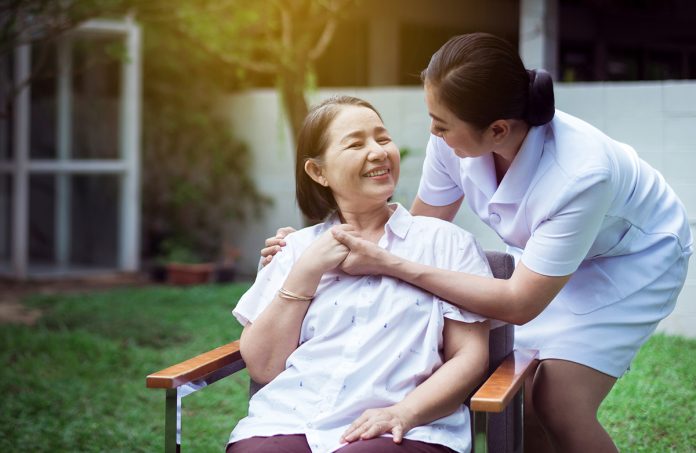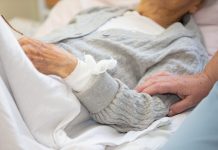Ms Bel Wong, Dr Kenny Chui and Prof Timothy Kwok from the Jockey Club Centre for Positive Ageing, walk us through a programme that supports people with younger onset dementia (YOD)
Younger onset dementia (YOD) is defined as people who exhibit dementia-related symptoms at or before 65 years old, the onset age can be as young as 30 years old.1,2 World Health Organization (WHO) estimates that YOD accounts for 9% of dementia population, with this figure, it is estimated that there are over 13,000 people in Hong Kong who are with YOD.3-5 Alzheimer’s Disease (AD) is the most prevalent clinical diagnosis among YOD, followed by frontotemporal dementia (FTD) and vascular dementia.6-8 The Chinese University of Hong Kong set up the “World’s First Research Registry on Early Onset Dementia in Chinese Population”, the mean age of onset was 58 years old, and the youngest patient was only 38 years old. Dementia can strike young people and their whole families; there is an urge to develop the service model as well as a structured intervention package regarding the specific needs of people with younger onset dementia.6
Younger onset dementia (YOD) explained
People with YOD may not have typical dementia-related symptoms such as memory problems; people with young- onset AD are worse in visuospatial functioning, executive functioning, and attention than people with late-onset dementia,5 while people with young-onset FTD are more prone to exhibit behavioural issues and language-related problem.6 These atypical clinical presentations make people with YOD more difficult to receive timely diagnosis and appropriate intervention.
People with YOD need to deal with a huge change of their roles in the workplace (early retirement or being dismissed from work) and family (to change from caregiver to care recipients at a relatively young age). The deprivation of the roles and duties would lower their self-esteem and make it psychologically difficult for them to adapt to the situation and receive help from others. People with YOD who receive a diagnosis are usually in their 50s to 60s.6,9,10 At such an age range, they are more likely to be the financial contributor in their family; the onset may deprive them of their work duties and result in their early retirement, therefore, causing adverse effects on the financial arrangement of the family such as income, mortgage, etc. Early retirement may make them no longer be able to financially support their parents as they used to. Research showed that the caring cost of YOD is nearly twice that of Alzheimer’s Disease, putting the family of people with YOD under further financial burden.11
The older parents and the dependent children of the people with YOD may lose an important caregiving force physically, psychologically, and financially, they are likely to turn from “care recipients” to “caregivers”. This change has a particularly big impact on the older parents because they are no longer capable of picking up the caregiving role. The atypical symptom exhibition of YOD (such as difficulty in communication, behavioural issues, etc.) would cause misunderstanding and psychological burden to the caregivers and friends, making them more difficult to support the people with YOD. Therefore, there is a need to provide YOD-specific support to the family members and friends so that they can be more equipped to co-work with the people with YOD to develop a new normal life.
Younger onset dementia project
With the donation of The Hong Kong Jockey Club Charities Trust, Jockey Club Centre for Positive Ageing (JCCPA) launched a pilot project to support people with younger onset dementia and their care partners. The protocol is developed based on the YOD programme of Dementia Australia, that aims to address the special and individual needs of people with younger onset dementia (PWYOD) and their family care partners, and to facilitate them to live well with dementia through mutual support.
Our protocol adopts the medical-social integration service model, including a 30-hour intervention to PWYOD and their care partners lasting for three months plus two to three months of follow up period, referral of potential cases to medical diagnosis, joining empowerment programme and consultation from specialists.
Case referral
JCCPA will collaborate with public hospitals and private neurologists or psychiatrists, etc. for case referral, in the hope to establish a feasible, systematic referral pathway between medical and social service sectors. Medical diagnosis will be subsidised for referral cases in the hope to encourage the potential cases to go for a comprehensive diagnosis since many people may encounter difficulties in finding appropriate specialists for making a diagnosis.
Intervention protocol
Our intervention protocol is designed based on the “Younger Onset Dementia Key Worker Program” developed by Dementia Australia,5,12 which covers the following domains:
- Knowledge about younger onset dementia
- Understanding the diagnosis
- Living well with dementia for the PWYOD and carers
- Community services and support.
The intervention will adopt a holistic care model of mobilising not only people with YOD, but also their familial and peer resources for living well in the community. The total intervention hours would be 30 hours, including clinical observation, individual and/or group counselling and consultation, a tailor-made care plan (well-being action plan) formation and a monthly review.
The well-being action plan (WAP) documents the wills and preferences of PWYOD, the individualised care needs of each family, the experience in the intervention and the practical solutions for coming daily life management. The advanced care plan and achievement of WAP for both the PWYOD and their care partners will be recorded. Such protocol would ensure that the specific needs of every family are addressed, the monthly review and formation of a well-being action plan ensures that the PWYOD and their care partners have ample time and support from the case managers until they are empowered to live with younger onset dementia after the intervention.
Specialist consultation
All the PWYOD families joining this programme would have two sessions of specialist consultation according to the needs of PWYOD. The consultations included:
(i) a speech therapist for addressing aphasia and preserving communication abilities;
(ii) a psychiatrist or neurologist for medical or neurological post-diagnostic consultation;
(iii) an occupational therapist for at-home environment modification assessment and
advice;
(iv) a family therapist for family counselling and cohesion.
The evaluation of this programme would be a one-arm, mixed-mode evaluation to investigate the barriers encountered by the PWYOD and their care partners when they seek medical diagnosis and appropriate services, and their changes in psychological and functional well-being, as well as competence in living with younger onset dementia after the intervention. The evaluation results would help us formulate a feasible service model to facilitate PWYOD and their care partners to receive appropriate and timely medical and social services.
References
- World Health Organization. Dementia: a public health priority. World Health Organization; 2012.
- The Hong Kong Council of Social Service. Young Onset Dementia. The 21st IAGG (International Association of Gerontology and Geriatrics) World Congress; 2017.
- World Health Organization. Dementia. 2019. https://www.who.int/news-room/fact-sheets/detail/dementia
- HKSAR Census and Statistics Department. Hong Kong Monthly Digest of Statistics. In:May 2020.
- Baborie A, Griffiths TD, Jaros E, et al. Frontotemporal dementia in elderly individuals. Archives of neurology. 2012;69 (8):1052-1060.
- Wing Chi Au L, Wong A, Abrigo J, Yuen YP, Yim Lung Leung E, Chung Tong Mok V. Early-onset dementia in Chinese: Demographic and etiologic characteristics. Neurology Asia. 2019;24 (2).
- Vieira RT, Caixeta L, Machado S, et al. Epidemiology of early-onset dementia: a review of the literature. Clinical practice and epidemiology in mental health: CP & EMH. 2013;9:88.
- Lam BYK, Au LWC, Wong A, et al. The registry for early-onset dementia and caregivers In Hong Kong (REACH) study – clinical characteristics of FTD patients in Hong Kong. Journal of Neurochemistry. 2016;138:384-384.
- Werner P, Stein-Shvachman I, Korczyn AD. Early onset dementia: clinical and social aspects. International Psychogeriatrics. 2009;21 (4):631-636.
- Smits LL, Pijnenburg YAL, Koedam ELGE, et al. Early Onset Alzheimer’s Disease is Associated with a Distinct Neuropsychological Profile. Journal of Alzheimer’s Disease. 2012;30:101-108.
- Galvin JE, Howard DH, Denny SS, Dickinson S, Tatton N. The social and economic burden of frontotemporal degeneration. Neurology. 2017;89 (20):2049-2056.
- Dementia Australia. Younger onset dementia hub. 2019; https://yod.dementia.org.au











